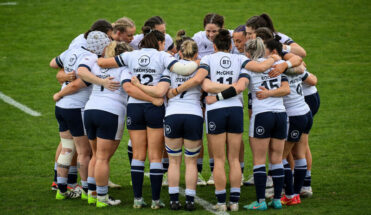Scotland’s 1984 Grand Slam – Part Two
Having beaten England to win the Calcutta Cup, Scotland waited nearly a month for their next fixture, against Ireland at Lansdowne Road, in a bid to win the Triple Crown.
*This is the second part of this feature. You can access the first here.
ON THE TROPHY HUNT IN DUBLIN
With Scotland not playing in the third round of matches – France won away in Cardiff and England did for Ireland at Twickenham – it meant a near-month of recovery time with which to plot a Triple Crown bid. 46 years since their last such silverware, the stakes were pretty high for a Lansdowne Road encounter against a team who shared the championship in 1983 with France.
What played out was far from the tight affair expected in Dublin, with Scotland racing into a 22-0 half-time lead, which would see them, to all intents and purposes, coast to the Triple Crown.
Roy Laidlaw’s mesmeric try double grabbed the headlines of course, the Jed-Forest scrum-half displaying all the trickery and twinkle synonymous with such a clever half-back. Further tries from the returning Keith Robertson (Euan’s replacement post-England) and Peter Dods, who unsurprisingly nailed five kicks for a match haul of 16, with a penalty try thrown in for good measure, bamboozled the Irish on their own turf as Scotland ran away 32-9 victors. It remains Scotland’s largest winning margin away to Ireland.
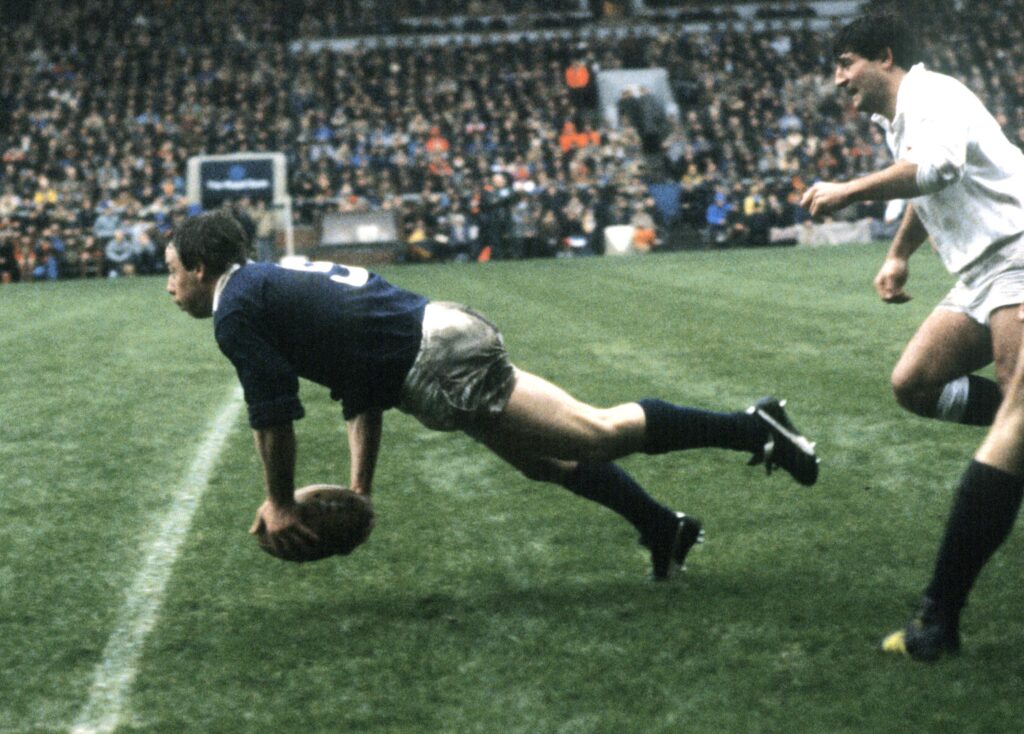
Pictured: Roy Laidlaw, who scored a majestic brace of tries against Ireland in ’84, performing a balletic scrum-half pass in the previous game against England.
JC: “It was all a little bit of a surprise! Roy just loved playing in Dublin and he’d scored twice in a ‘B’ match a couple of years earlier. We just needed to see out the second half and I think we scored right at the very end to take it even further away, so it was a great day. We’d won this mythical Triple Crown and then Jim Telfer started talk of a Grand Slam.
“But it was the first time we’d won the Triple Crown since 1938, so we felt like we’d earned a good night on the back of that and we had a couple of weeks to get ready for the French game.
IM: “It was a dream, we played well but everything went for us. We pushed them over in the scrum for a debatable penalty try and Roy scored two great tries. England, France and Wales were not great teams by their own standards but Ireland had a great, experienced pack and had won the Triple Crown in, I think, 1982 as well as sharing the title in ’83.”
Claiming what was a seventh Triple Crown was a breakthrough for a Scotland team whose talent was unquestioned, but who also needed a tangible marker to lay down as a legacy. Beating Wales, England and Ireland did just that and although more was to come, the players took time to momentarily bask in their spoils.
IM: “I’m not sure how much reality sank in after beating Ireland. Winning the Triple Crown, which I think we’d only done seven times up until then, was something we wanted to achieve and enjoy. To do it in the manner we did; it’s very seldom you get to relax in the second half which to a degree we could at 22-0 up. None of us would ever say that to one another, but we knew the situation.
“Jim Telfer tried to dampen the celebrations slightly because suddenly we had the opportunity to make real history with France to come, but I don’t think we were having any of it and we definitely enjoyed ourselves!
THE FINAL HURDLE
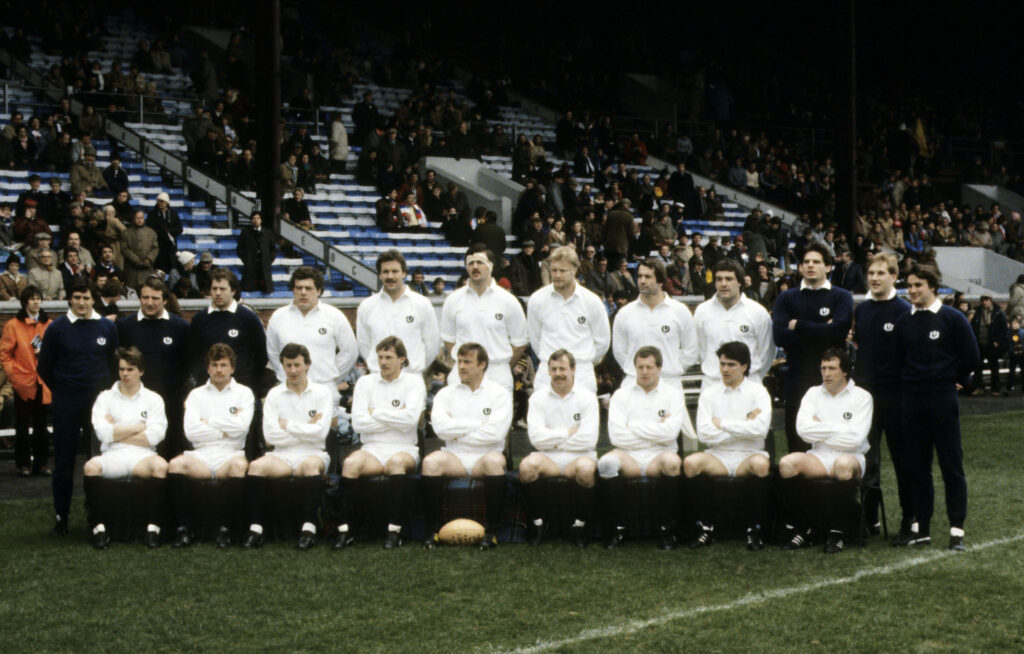
Pictured: Scotland’s Grand Slam winning team.
Back row from left: Andy Irvine, Norman Rowan, Gary Callander, Iain Milne, Iain Paxton, Alan Tomes, Alister Campbell, David Leslie, Jim Calder, John Beattie, Douglas Wylie and Stuart Johnston.
Front row from left: David Johnston, Jim Pollock, Keith Robertson, John Rutherford, Jim Aitken, Roy Laidlaw, Colin Deans, Roger Baird and Peter Dods.
With two weeks in between the Dublin win and a Grand Slam shootout with the unbeaten France at Murrayfield, Scotland had time to recover physically and plot a route to glory. Les Bleus were unquestionably the favourites but as had happened throughout the championship, the Scots found a way.
EK: “I got tickets with my brother – I had to request an aisle seat because of the knee, but I was delighted we’d managed to win in Ireland and then the build-up to the France match, it was just amazing.”
JC: “It was low-key, and we’d won the Triple Crown which had been big news. France were the form horses but we’d won two away games, beaten England fairly comfortably at home and France were very, very good at home but not always as much away.
“In fact, throughout the whole of the 1980s, they didn’t win at Murrayfield. So there was a quiet confidence but little pressure on us, which was the ideal situation.”
As many anticipated, France were in the ascendancy in the opening exchanges, carving out a 6-3 half-time lead through a Jerome Gallion try, converted by Jean-Patrick Lescarboura. Peter Dods, as had so often been the case, kept the French honest with a penalty goal; there was plenty more where that came from.
JC: “We withstood them in the first half and then grew into it in the second half. We talk about The Bear, and it wouldn’t have happened without him. He was unbelievable and the French had massive respect for him. If he was playing just now he’d be playing in France and worth millions.
The scrum-half Gallion was unceremoniously dumped out of the game by David Leslie shortly after half-time, which a watching Euan Kennedy describes as having “potentially changed the game as Gallion had been playing really well that season.”
Three penalties from the metronome Dods, on the back of some serious French indiscipline, brought the scores level after Lescarboura had landed two of his own. And then came the try that won Scotland their third Grand Slam.
JC: “I do remember getting to the line-out and thinking ‘if I just go through a wee bit, ahead of Jean-Pierre Rives who was at the back, he’s not going to hold onto me. I took a wee step, if you like offside, and the ball came down into my hands and I scored.
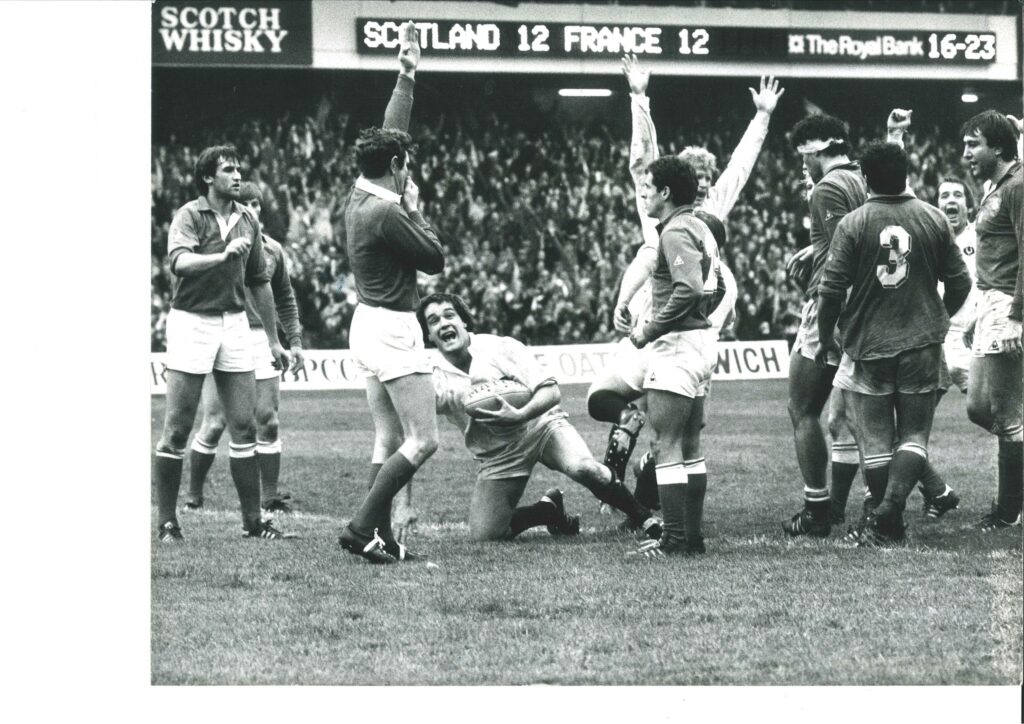
Pictured: Jim Calder’s reacts with glee to his iconic 1984 try against France which helped clinch Scotland’s second Grand Slam title.
“I was still slightly surprised that the referee gave it and actually mentioned it on the TV later that evening, which I shouldn’t have, because for the next two or three seasons, refs kept on penalising me for being offside!
IM: “I thought they had more dominance than the scoreboard suggested but we got on the right side of the referee, Winston Jones, and got one or two decisions in our favour. We defended really well in the first half when they were all over us.
“I could feel, in the front row, us starting to get the edge. They were struggling a wee bit, getting frustrated and the odd punch was coming through. I laugh at that now because if you’re punching, you’re not scrummaging!
“Peter Dods kicked everything when they gave away a few silly penalties and they contributed to their own downfall as favourites.”
Kick everything Dods did, including earning Scotland a crucial penalty when taken out late by opposite man Serge Blanco. It was needless and reckless by an increasingly frustrated French side and when the full-back eventually got to his feet, he landed the goal as if it were a training match.
When referee Jones signalled for full-time, to a rapturous and scarcely-believing Murrayfield, Scotland head beaten the tournament favourites 21-12 and won, incredibly, a Grand Slam for the first time in 59 years. A quiet series of celebrations then, surely?
HERE’S TO A GRAND SLAM!
IM: “There was a big celebration on Saturday night after the game, realising what we’d done and how huge it was to win only a second Grand Slam in Scotland’s history. We were at what is now The Balmoral Hotel; it was called the North Bridge in those days, and then after that I went to work on Monday like everyone else did in those days.
“I remember I went for fish and chips on my lunch break and the restaurant owner said to me “hey big man, I didn’t realise you played rugby, you’re not paying for this today,” so suddenly people were aware of what we’d achieved.
“That was one of the joys of international rugby in those days, going to work after the weekend match. If you worked, you’d maybe get the Friday off the day before a game but that was it; you had to rely on understanding employers!
JC: “I think it was more relief than anything else. We talk about it 40 years later so the importance of that day and game just got greater over the years, but thankfully we also did it [won a Grand Slam] six years later, and the common thread is Telfer.
“We would not have achieved it without Telfer taking the reins and demanding so much of players. He was like Alex Ferguson; if he’d been coaching in the professional era, he’d have been right up there in the two or three elite coaches in the world – he was that good.
“I used to work as a sales rep for a medical company, and I had an 8:30am meeting with a surgeon on the Monday. There I was, sitting there and he knew nothing about rugby but knew Scotland had won, and he said to me: “That was a great win for Scotland, wasn’t it? Were you at the game?”
“To which I replied: “Well, yes!” but I didn’t go much further than that. I never saw him again actually, but that summed up the difference in the professional and amateur era. It certainly kept you grounded!
EK: “It undoubtedly is one of the hardest things to do in rugby, for any country. Everything needs to fall into place and you need your luck at certain times in games.”
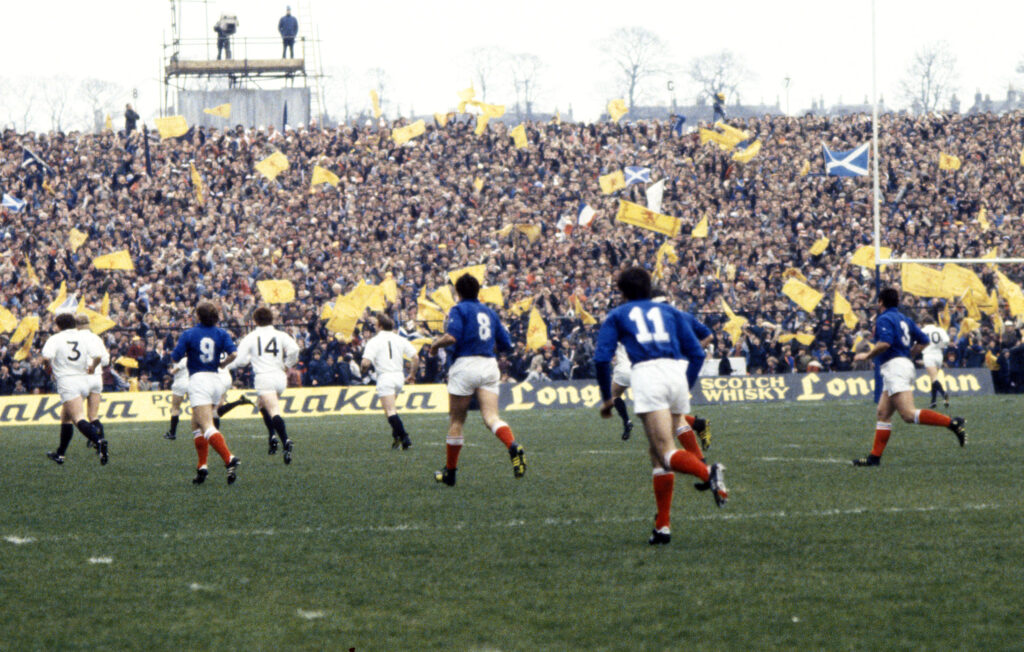
Pictured: The scenes at Murrayfield the day Scotland won the Grand Slam: 17/3/1984
Related Fanzone

Silver Saturday 2024 match reports
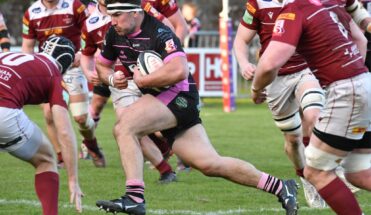
Review of Round 2 | Super Series Sprint
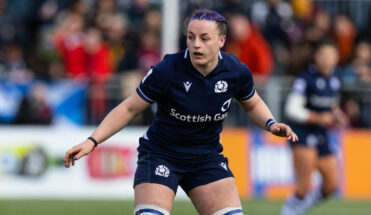
Ireland v Scotland Women | Preview
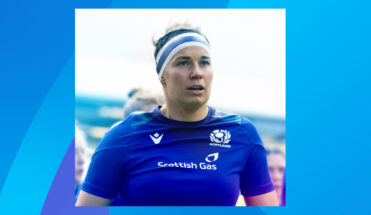
Podcast: Rachel Malcolm | One to one with Caroline Blair
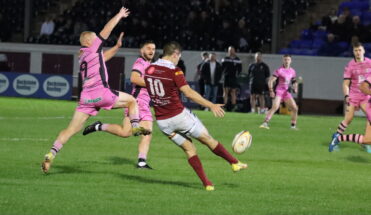
Guide to the Games | Round 2

WATCH LIVE: 2024 Silver Saturday
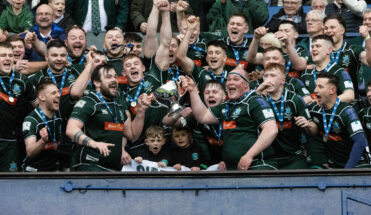
Silver Saturday preview: Scottish Cup final: Edinburgh Academical v Hawick
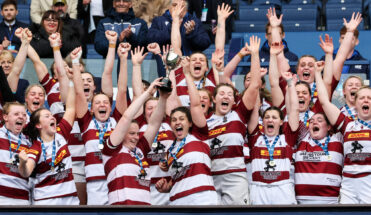
Silver Saturday preview: Sarah Beaney Cup: Watsonians v Hillhead Jordanhill
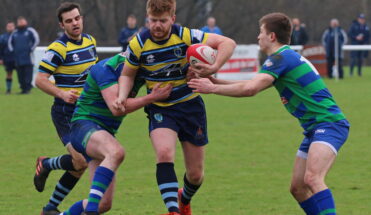
Silver Saturday Preview: Men’s League Cup final: Lasswade v Falkirk
